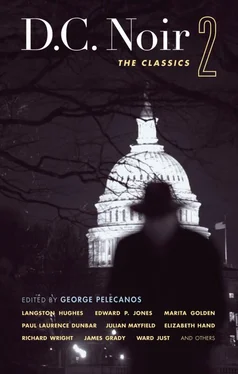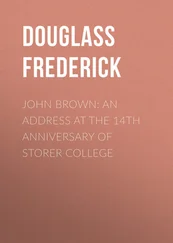Everybody thinks it’s postal workers who are the major victims of workplace crime. It’s really the immigrants and teenagers and retired giving-my-own-business-a-try salesclerks behind the counters of convenience stores who are the most vulnerable workers in America. It’s always open season on them. Every damn day of the week is a “good day to die” for one of them somewhere in the land of the free. By just standing at the magazine rack, thumbing through copies of Hustler or Newsweek , or shooting the breeze for a half hour with whoever is working, Carson can stop a crime.
Because Carson doesn’t tell the boys to move on, to go home, they continue to stand outside, as loud and boisterous as if they were playing video games and sipping forties in their living room instead of standing in a public place. He could get them for congregating beneath the No Loitering sign, but he doesn’t.
He and Eric used to debate all the time which was worse, more dangerous: the boredom that makes you lazy, careless, stupid, or the nights of pure adrenaline, responding to priority calls back to back. And don’t let it be another officer down. But that’s why Carson is out here. Why he’s a cop. He loves the rush. The risk. Everything on the line. The pressure. The chance to change somebody’s fate, save a life, because he got there in time to catch the burglar, prevent some jerk from giving his wife an ass-whooping and turning her into a corpse. Or maybe he stops a killer on the side of Route 450, pulls him over because the knucklehead is driving a car with broken taillights, expired plates, and when he runs his license through the computer he discovers this is a live one, the kind of scum they build prisons for, and when he searches the car he finds a weapon. And not just any weapon, but one that’s loaded and has been used in a murder.
Still, 95 percent boredom. That’s Carson’s average week. Sometimes his average month. This isn’t nearby Washington, where there are weeks when somebody gets killed every night. This is the ’burbs. But still.
On this March night, a night when it is not quite spring, when it’s a chilly forty degrees, there’s this flat-out wide-faced moon in the sky. A moon so big and awesome it’s like a gigantic neon eye or face. A full moon, bursting the seams of the heavens. Milky and liquid and trembling. It’s not white but some strange kind of orangey yellow, like no moon Carson can ever recall seeing in the sky. The full moon . That’s the only odd thing. The only unexpected thing on this night, when Carson has given a couple of speeding tickets and the radio has been mostly silent.
Carson isn’t superstitious. Not like Steve, who keeps a rabbit’s foot in his wallet, or Eric, who recited the Twenty-third Psalm, closed his eyes and said it silently in the squad car before he pulled out of the station lot. “ The Lord is my shepherd, I shall not want .” No, Carson figures all that just attracts catastrophe. Why depend on luck instead of yourself? Why close your eyes to pray when what you fear could be closing in? So that moon, which he will tell Bunny about if she’s awake when he gets home, that’s the only strange thing so far this night. His patrol service area includes everything — the area around Martin Luther King Boulevard, the weathered houses and streets of the working-class neighborhood near the FedEx Field football stadium, and the moneyed community called Heaven’s Gate. It’s mostly the area around King Boulevard that keeps him busy with burglaries, robberies, drug traffic. But this night, one hour before his shift ends at midnight, Carson congratulates himself. It’s been quiet. Maybe too quiet, even for a weeknight. But there is nothing in the quiet that makes him think that the worst will be saved for the last moments of his shift.
Half an hour after leaving the 7-Eleven, he’s making one last swing around Enterprise and Lottsford roads, past million-dollar houses and the estates behind the barriers of gated communities. He isn’t doing that well, but with his salary and the $25-an-hour part-time security work he performs, and Bunny’s recent raise, they are a $150,000 household and he lives fifteen minutes away. He doesn’t live in Heaven’s Gate, the community he’s just passed that has been written up in magazines and even the New York Times as symbolic of Black suburban progress. He lives in Paradise Glen, and Carson is just as happy in paradise as he figures he’d be in heaven. He knows police officers who drive Jaguars and Benzes, have high-six-figure salaries, and are in debt up to their ears, cops addicted to doing nothing but working and making money the way some are in the grip of booze and women.
Carson spots another squad car parked in the lot of Kings-ford Elementary School. When he pulls up beside the cruiser, he immediately sees that it’s Wyatt Jordan. The fluorescence of the parking lot lights glows on his massive shaved head. Carson parks beside Wyatt and gets out. He stretches his arms and shoulders as he walks around to the other side of his cruiser. Jordan’s thick, rumbling laughter is the only sound besides the occasional car cruising past on Enterprise Road. The conversation, which Carson hears through Jordan’s half-open window, has the sound of an easy, illicit dialogue, and he figures Jordan is having phone sex. There are all kinds of rumors about Jordan, that he’s hooked on Internet porn sites, and Carson knows he’s a player, has seen him in action. He’s been busted more than once for stopping by his girlfriend’s house for a quickie while on duty, and his wife waited for him to get off his shift one evening and jumped out of her Volkswagen and charged after him with a baseball bat.
“Drama Queen” is Carson’s nickname for Jordan. He’s got no respect for cops who let their lives become a public mess. He knows Jordan from a distance, and he’s fine with that. But hell, he can shoot the breeze for a minute. Jordan ends the call and snaps the cell phone shut.
“Am I interrupting something?” Carson asks, leaning on the side of the cruiser, letting a wide, wily grin spread over his face.
Jordan extends his beefy arm out the car window, a raucous laugh rumbling up from his chest. The two men slap palms and shake hands. “Come on, Blake, ease up — I know what you heard, and it’s all true.”
“All the hardheads must be working a new shift or stayed home instead of risking running into you,” Carson says.
“That’s what it looks like. Only real action I had tonight was a domestic disturbance call over near Bowie High School. By the time I got there, the dude didn’t wanna press charges.”
“Say what?” Carson laughs at the thought of where this story is headed.
“No joke.” Jordan opens the door of his cruiser and lifts his bulk out, leaning on the side of the car. He’s six-seven, two-seventy-five, and solid as a rock.
“You heard me. Dude was getting a Mike Tyson work-over by his girlfriend. He had a black eye. I did the counseling routine. When I got there and saw what was happening, I figured she kicked his ass over another woman. But she claimed he stole some of her money. In my man’s defense, though, she had about three inches on him. He was drunk and kept telling me he called 911 ’cause he didn’t wanna hit no woman.”
“So this was love and money?”
“Yeah, you know, half the calls are rooted in one or the other.”
“You going to the cabaret at the Chateau Saturday night?” Carson asks.
“I’ma get my ticket at the door,” Jordan says.
“I ain’t gonna tell you what I had to do to get Saturday night off — I owe Benson big-time,” Carson says sheepishly.
“Out with it, tell me …”
The two men stand gossiping, trading an easy banter that makes Carson ponder that this is the first time in a long while that he’s really talked to Wyatt Jordan. Jordan finally looks at his watch and says, “I better start heading back in. And I hope like hell I don’t run into anything on my way.”
Читать дальше











